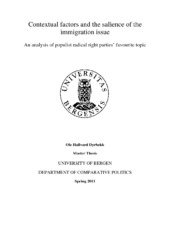| dc.description.abstract | This master thesis seeks to explain how structural factors influence the salience of the immigration issue. Stated more precisely, the research question is: To what extent does immigration influence the salience of the immigration issue, when also taking other main plausible factors into account? To answer the research question, literature on populist radical right (PRR) parties is combined with issue salience theory. Previous research from the demand side account of the PRR party literature has often tried to explain how structural factors influence the electoral support for these parties. Their claim is that immigration and the multicultural society has facilitated the success of PRR parties. However, their empirical support for this argument is generally contested, especially by more supply side oriented scholars. Issue salience theory contributes with relevant intervening factors to the causal chain mentioned above. From this perspective, the electoral success of PRR parties should partly hinge on the salience of the immigration issue. Also, the salience of the immigration issue should, in theory, be more closely related to sociostructural factors. Factors related to party competition, generally associated with supply side theories, are believed to enter the causal chain at a later stage. Thus, the argument in this thesis stretches from structural factors to the salience of the immigration issue. Even though such a focus would provide much insight into how the PRR parties' single-most important issue becomes salient, it has yet not been thoroughly investigated in the literature on PRR parties. To investigate the research question, this thesis uses two different analyses on a selection of 14 Western European countries from 2003 to 2009. The variation between countries is analysed first. The results show that the share of foreigners and the inflow of immigrants probably do increase the salience of the immigration issue. There is seemingly a threshold effect of the share of foreigners; for the immigration issue to become important there must be a sizable share of foreigners in the country. When the variation within countries is analysed, it is found that a prosperous economy increases the importance of the immigration issue. The results also show that increased immigration does increase the salience of the immigration issue, but only as long as the unemployment is low. This supports the claim that the absence of problems related to the economy facilitates increased salience of the immigration issue. | en_US |
